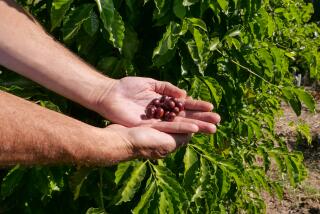Java Moves to Head of the Class
- Share via
DANVILLE, Ky. — For years, sociology professor William J. “Beau” Weston has held informal office hours off campus in a local coffee shop, sipping his mocha latte while advising students.
As he did, Weston formed relationships with other coffee shop regulars who might otherwise have remained strangers.
That caused a sort of academic epiphany, and now he’s one of a handful of teachers across the nation who have developed courses that study coffee and its effect on society.
Don’t drop your morning cup of joe. Weston’s class, offered during a recent intensive three-week term at Centre College, was hardly “Starbucks 101,” although the 15 students who enrolled in “The Cafe and Public Life” could be forgiven if that was their original impression.
Audrey Rogers, a freshman from Dallas, said she wondered about the academic strength of the class: “I didn’t know how it was going to last a week.”
Weston understood such skepticism and designed his course to focus not only on coffee as a drink, but on how its consumption had changed society through the centuries.
A class on coffee might seem strange at a college like Centre, an elite private school known for producing two Supreme Court justices and hosting the 2000 vice presidential debate between Dick Cheney and Joe Lieberman.
Then again, unique classes are becoming commonplace at the school of about 1,100 students. Last year, a Centre professor taught a class called “Basketball as Religion,” playing off the passion for hoops in the Bluegrass State.
John Ward, Centre’s vice president for academic affairs, said that all courses were approved by a curriculum committee that consisted of faculty from across the campus who examined the “intellectual contexts” of any proposed course.
Ward says offering classes like the ones on basketball and coffee “is as if you hold a microscope up on something really interesting. We apply the same academic and intellectual rigor in courses like this as we do in advanced literature, language or science courses. It’s the same tools.”
Weston’s regular trips to coffeehouses led to “an interest in cafes as a place in which strangers can talk to one another” and discuss the issues of the day.
“Having a place to do that enriches a culture,” he said. “Cafes are important for creating a public life, particularly in a democracy.”
At Atlanta’s Emory University, the University of Washington and UC Irvine, similar courses are taught by professors with diverse academic backgrounds, including anthropol- ogy, chemistry and history.
Studying coffee “really combines so many disciplines,” said Mark Pendergrast of Colchester, Vt., the author of “Uncommon Grounds: The History of Coffee and How It Transformed Our World,” which was used as a textbook in Weston’s class at Centre.
“Everywhere you look in our culture, coffee has a fairly profound effect,” he said. “It’s a wonderful way to teach history and culture and economics.”
UC Irvine history professor Steven C. Topik began teaching his “History of Coffee” writing seminar course in 1996.
Coffee “is just not something we think about,” Topik said. “History is usually taught as the history of great men and wars and great events. We don’t think about the history of everyday things,” he said. “But historians have been increasingly thinking about these things.”
Studying coffee “is a palpable, liquid way of understanding globalization,” Topik said.
University of Washington chemistry professor Joe Norman had another practical reason for developing his honors seminar, “Coffee and Humanity.”
“It’s fun, and I think education should be broad like this to some extent,” Norman said. “Of course, Seattle is a good place to offer such a seminar. There’s enough coffee around here.”
There apparently also was plenty in Kentucky. Students in Weston’s class visited roasters and coffeehouses in Danville, Lexington, Louisville and Georgetown and freely imbibed.
Rogers, for one, came away from those trips -- and the class -- with a heightened sense of how coffeehouses had affected modern society.
“The cafe is a lot more diverse,” she said. “You have business people, students, motorcycle riders. A good cafe is a place where everyone goes.”






